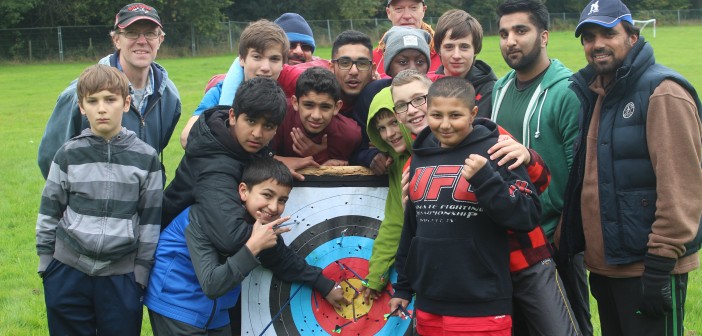” And the ministry he chose for us is to work out how to help Christian young people engage well with their peers of other faiths.”
In early 2010 my family and I relocated from Brisbane to Birmingham in the UK, for me to join a brand new charity started by Scripture Union called The Feast. Before this I had spent nearly 10 years with SU Queensland, based on the southside of Brisbane supporting the growth of school chaplaincy and developing camping and missions programmes (yes that is the funny way we spell “programs” in England!)
This is not the place to share the journey of how we came to be here, except to acknowledge that God can take us where we least expect it if we are available. And the ministry he chose for us is to work out how to help Christian young people engage well with their peers of other faiths.
The UK is an incredibly diverse country. You may think it is much higher, but the largest non-Christian faith group is Islam with 4.7% of the population, with most from the South-Asian countries of Pakistan and Bangladesh. The next smaller groups include Hindu’s, Sikh’s and Jews, along with the rapidly increasing numbers of those who ascribe as non-faith. Birmingham is approximately 22% Muslim, and the areas where we live and work the proportion is more like 70%.
The Feast was setup by a Christian youth worker who was grappling with how best to share the gospel of Jesus with these young people of Muslim, Sikh and Hindu faiths. Historically, the church had either entered into a more pluralistic, all-roads-up the-mountain approach which focused on similarities between our faiths, or the other extreme of polemic debate and emphasising the differences (ie how they were wrong). Neither of these options were satisfying or effective.
Instead, motivated by Jesus’ teaching to love our neighbour (Luke 10:30-37) and Paul’s instruction to “always be ready to share the hope we have … with gentleness and respect” (1 Peter 3:15), The Feast is encouraging a different approach.
We clearly believe that it is possible, and vital, that followers of Jesus can learn to actively love our neighbours of other faiths – whether they are physically nearby us or not – and to witness to the gospel without compromise.
To assist you in thinking about how your youth ministry might consider this often-neglected mission field, and possibly to help you overcome any reservations or fears, can I give you ten tips we have picked up that might be of some assistance:
- Stop learning about – Do something about meeting them. Say hello. Introduce your self and ask about their day, their family and their interests. You’ll be pleasantly surprised now normal and interesting your peers are.
- Examine your own motives for connecting. How would you feel if someone was only friendly with you because they wanted to sell you something? Will anything change if they do not convert? Commit to befriend because they are worthy of love and friendship, not because of what you want God to do for them. It is a subtle difference but so important.
- Put your faith into action. Less promotion of faith – more free samples. There is a time to speak about our faith, but what do people of other faiths see by way of our faith in practice? Instead of mere religion, let the world see our deeds of compassion, forgiveness, generosity and grace.
- Be transparent. Speak and behave the same whether they are in the room or not. Honesty is a powerful and rare trait in the world today. Do not hide or be ashamed of desire to see your friend of another faith come to Jesus, but likewise be prepared they they may want to convert you. They will trust you much more when you prove trust-worthy.
- Remember family. The young people of other faiths you meet are inextricably connected to their parents, grandparents, cousins, uncles … This is very different to our Western culture, but do not see it as bad. From these communities you cannot treat a teenager or child in isolation from their family, as we may be able to for the majority of Australian young people. If you are getting to know a young person it is important you also connect well with and honour their family.
- God is already at work. His mission does not start and stop with you, but instead prepare to join his ongoing work. As we see in Acts 10, God is working in the lives of both his servants and those we are sent to reach, and so we have the privilege to riding on the waves he provides.
- Speak about Jesus all the time. He is what makes us so incredibly different. The best thing about walking with my friends of other faiths is how much I have grown in my sheer admiration and worship of Jesus. Above all our trappings of religion, he is the very very best thing about my faith and who I love to share about the most.
- Acknowledge your own discomfort. It is ok to not have the answers. In 1 Cor 8 we learn that “knowledge puffs up, yet love builds up”. Excel in love, say sorry for misunderstandings, be vulnerable when messy or complicated things come up, and in increasing measure place your trust in God who knows all things.
- Be ready to change. God really does shift things inside us when we love the lost. A ministry like this is brilliant for nurturing our own faith – and especially good for discipling young Christians. Allow God to challenge you, exposing your own prejudices, selfishness and apathy which he may want to change before he changes them.
- Have fun! Laugh lots. Try new foods. Experience their cultures and enjoy sharing your own. Who said connecting with people of other faiths had to be serious and scary!?
Whatever you do, please do not stay safe in your Christian huddle and miss out on the chance to follow Jesus to the edges of society, where the really exciting work of following Jesus happens.
Praying for those of you who have opportunities to apply and benefit from our experience, and looking forward to hearing how you, your young people and your churches are blessed as you reach out to you neighbours of other faiths.
This article was written by Tim Fawssett, CEO of The Feast. You can contact Tim at The Feast.




